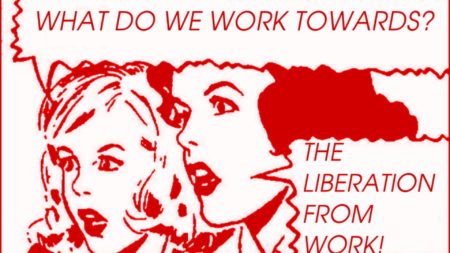For decades, the left has split roughly into a pro-work and an anti-work camp. David Frayne doesn’t exactly frame his book The Refusal of Work as a contribution to that debate. But lots of people on the anti-work side cite it in support of their views. And so, I recently read The Refusal of Work with an eye toward its implications for that debate.
I’ll lay out a few thoughts on The Refusal of Work in this post. I think the book makes some valuable contributions to moral and political debates about work. It lays out some of the problems with work and helps us imagine alternatives. But I don’t think Frayne does many favors for the anti-work socialist camp.
Anti-Work vs. Pro-Work
In one sense, people in the anti-work and pro-work debate talk past one another. The anti-work side points to problems like structural unemployment, using it to advocate for ideas like UBI. Frayne does this, too. But this doesn’t really get to the heart of the anti-work argument.
The anti-work side – as well as Frayne – points to the problems with work itself. Work is an alienating and authoritarian experience. Many people find work uninteresting and unfulfilling. As David Graeber puts it in his book Bullshit Jobs, work is full of…well…bullshit jobs. Many people find it a waste of time, at best, and abusive, at worst.
But the pro-work side doesn’t object to any of that. It’s not about defending work as it exists now. Rather, pro-work socialists want to organize workers, seize the workplace, and run it democratically. They advocate strong unions, workers co-ops, and so on.
By contrast, the anti-work side often says little about workplace organizing. The Refusal of Work, in this sense, stays true to form. Frayne includes a nod or two to organizing, but mostly he interviews isolated individuals about their experience leaving the workplace. He presents a few political ideas, but doesn’t say a great deal about how to achieve them.
The Refusal of Work
Let’s turn to the book. Frayne explicitly frames The Refusal of Work as a contribution to moral debates. That’s obviously an angle different from mine.
But the moral perspective does have its uses. Frayne expands on why work seems so unfulfilling. He usefully compares service labor and tech labor to philosophical accounts of emotional labor. And he effectively takes down corporate HR attempts to ‘have fun at work’ or ‘display wokeness.’ That’s all right on the money.
Frayne also provides a useful historical narrative of how the corporate world justifies increasing hours even when it could’ve reduced hours: by presenting mindless consumerism as an alternative to more free time. But Frayne seems to miss exactly how that works. All this was really an ad hoc justification for corporate action, not a driver of action. Corporations increased hours because it was profitable for them to do so. The ideology came after the fact.
Finally, Frayne held quite a few interviews with workers. These interviews shed light on the stigma unemployed people face as well as the interesting things they do with their time. His description of ‘role-distancing’ among white-collar employees rings true. While these things play into Frayne’s moral case, I find them more interesting as a way to understand where people start from. Organizers must always remain aware of the starting point of the people they organize.
Organizing > Moralizing
I titled this final section with the key lesson both from The Refusal of Work and the broader debate between anti-work and pro-work socialists.
If we read Frayne’s book as a lesson in prefigurative politics or moral debate, then I think the book fails to teach us much. Moral debate won’t bring us closer to socialism. Rather, I want to read the book as a lesson in how to organize. We have to start by figuring out where people are, where they’re starting from. We won’t solve the problems of work by running a commune in the countryside or putting UBI in place. Nor by lobbying moral arguments at the wealthy. We’ll solve those problems by putting together a broad working-class coalition to take power.
